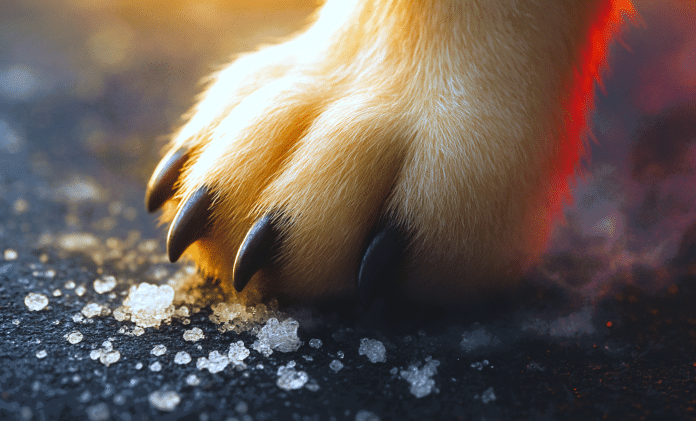Jackson, MS – As first frost warnings spread across Mississippi and overnight temperatures dip near freezing, veterinarians are urging pet owners to take precautions before early-morning walks. Even though the state rarely sees snow, road salt and chemical de-icers used during cold snaps can burn paw pads, irritate skin, and cause toxic reactions if pets lick or ingest them.
Ice-melt products often contain sodium chloride, calcium chloride, or magnesium chloride, compounds designed to melt frost and ice quickly. When pets step on treated roads or sidewalks, these chemicals can dry and crack paw pads. If dogs lick their paws afterward, they can swallow enough residue to trigger vomiting, diarrhea, excessive thirst, or lethargy. Severe salt poisoning can lead to seizures or kidney damage if untreated.
Veterinarians warn that pets in southern states are particularly vulnerable, as owners may not realize de-icers are being used during brief cold spells. Some products also contain industrial additives or heavy metals, which increase toxicity risks with repeated exposure.
To help prevent injuries, veterinarians recommend rinsing pets’ paws with warm water after walks and drying them thoroughly. A paw balm or protective wax can help form a barrier before going outside, while trimming fur between toes reduces the buildup of frost and salt. Booties can provide added protection for dogs that tolerate them. Homeowners are encouraged to use chloride-free, pet-safe ice melts on driveways and entryways.
With overnight lows expected to reach the 20s and 30s in parts of northern and central Mississippi, icy patches and frost could develop before sunrise. Veterinarians advise limiting outdoor exposure during the coldest hours and checking paws for signs of irritation or cracking.
As the first frost of the season arrives across the Magnolia State, experts emphasize that the biggest winter threat to pets isn’t just the chill in the air—but the chemicals coating the ground beneath their paws.





